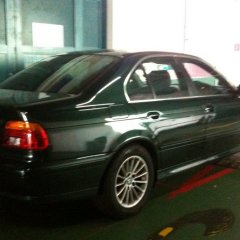Search the Community
Showing results for tags 'Asean'.
-
https://asia.nikkei.com/Spotlight/Myanmar-Crisis/Myanmar-military-chief-to-be-excluded-from-ASEAN-summit?utm_campaign=GL_asia_daily&utm_medium=email&utm_source=NA_newsletter&utm_content=article_link&del_type=1&pub_date=20211018123000&seq_num=2&si=44594 Myanmar military chief to be excluded from ASEAN summit Foreign ministers see 'insufficient progress' in Naypyidaw, bloc's chair says The commander-in-chief of Myanmar's armed forces, Senior Gen. Min Aung Hlaing, a conference on international security in Moscow in June. © Reuters KENTARO IWAMOTO, Nikkei staff writerOctober 16, 2021 02:21 JSTUpdated on October 16, 2021 17:16 JST SINGAPORE -- Foreign ministers from the Association of Southeast Asian Nations on Friday agreed to not invite Myanmar's military chief to a leaders summit this month because of slow progress on restoring peace in the country, according to multiple diplomatic sources. "Min Aung Hlaing will not be invited to ASEAN," said a Yangon-based ASEAN diplomat. ASEAN chair Brunei on Saturday confirmed the decision, saying, "There was no consensus reached for a political representative from Myanmar to attend [the ASEAN Summits and Related Summits] in October 2021." Instead, the foreign ministers' meeting accepted the decision to invite "a nonpolitical representative" from Myanmar to the upcoming summits, the statement says. Gen. Min Aung Hlaing's exclusion from the region's highest-level meeting highlights the growing pressure on the Myanmar military government, which has been reluctant to cooperate with the international community to settle unrest in the country since it took power on Feb. 1. According to the sources, foreign ministers from the 10-member bloc discussed the issue in a virtual meeting, in which Myanmar's military-appointed Foreign Minister Wunna Maung Lwin also participated. "The participation of Myanmar at the summits should not be represented at the political level until Myanmar restores its democracy through an inclusive process," Indonesian Foreign Minister Retno Marsudi tweeted after the meeting. ASEAN will hold the summit and related meetings from Oct. 26 to Oct. 28, which also involves the annual East Asia Summit, a regional meeting with the bloc's partners including the U.S. and China. The meetings are slated to discuss issues including security, trade and recovery from the COVID-19 crisis. Friday's decision comes amid a lack of progress in the "five-point consensus" road map for a peaceful resolution to the Myanmar crisis, which the members agreed on at an April leaders meeting in Jakarta. In August, ASEAN appointed Brunei's second foreign minister, Erywan Yusof, as its special envoy to Myanmar, tasked with mediating the political unrest. But Erywan has not visited Myanmar yet, although he had planned to do so earlier this week. During last foreign ministers' meeting held on Oct. 4, Malaysia and some countries raised the issue of not inviting Min Aung Hlaing to the summit. The bloc was "deep in discussions" about it, Erywan told reporters after that meeting. Meanwhile, Myanmar's foreign ministry said on Thursday that the military government was "committed to constructively cooperating in the implementation of five-point consensus." It stated the military government was not able to accommodate the special envoy's visit because Erywan had insisted on meetings with "some specific individuals," which appeared to mean the elected leaders ousted on Feb. 1, including Aung San Suu Kyi. The chair's statement released on Saturday notes that the foreign ministers "listened carefully to Myanmar's explanation of its implementation of the five-point consensus." However, there had been "insufficient progress," and "some ASEAN member states recommended that ASEAN give space to Myanmar to restore its internal affairs and return to normalcy in accordance with the will of the people of Myanmar." Responding to the statement, Myanmar military spokesman Zaw Min Tun told Nikkei Asia that ASEAN's long-standing principles, such as its noninterference policy, "have [been] derailed and weakened due to external pressure." The military government is also under pressure from international human rights groups. In an open letter to ASEAN leaders this week, the democracy group ASEAN Parliamentarians for Human Rights called for the exclusion of Min Aung Hlaing from the meeting, citing the military's "blatant disregard" for the five-point consensus. "It is time for ASEAN to act decisively," reads the letter, which goes on to say that this begins by denying the military government "the legitimacy it craves, and which has been rejected constantly by the people of Myanmar." Before Friday's ASEAN meeting, the governments of several countries including the U.K., the U.S. and Norway issued a joint statement, calling on Myanmar to "engage constructively with the ASEAN special envoy to also implement other aspects of the five-point consensus swiftly and completely." According to the Assistance Association for Political Prisoners, a rights group, 1,178 people have been killed by the military as of Friday since Feb. 1.
-
Malaysian PM Mahathir proposes new regional currency based on gold TOKYO: Malaysian Prime Minister Mahathir Mohamad on Thursday (May 30) proposed to create a new “special currency” for the region based on gold, replacing the existing currency trading regime. Speaking at a dialogue session at the 25th International Conference on The Future of Asia (Nikkei Conference), he claimed that a regional currency based on gold would be more stable. The prime minister said that by pegging the new currency to gold, it could be used to evaluate the import and export activities among East Asian countries. “We can make settlement using that (new) currency. That currency must be pegged to the local currency as the exchange rate, which is something that can be related to the country’s performance,” he said. “That way we know how much we owe, how much we have to pay in the special currency of East Asia." The new currency could also be extended to countries outside East Asia, he said. Dr Mahathir noted that the global market is now tied to the US dollar, and this makes the currency prone to manipulation. “Just because that one country is affected, there is infection to the other countries. Malaysia was very stable way back in 1997 (during the Asian financial crisis) ... but because of the problem occurring in Thailand, they said we must peg the Malaysian currency (to the US dollar),” he recounted. “What happened? The currency traders sold the Malaysian currency and the value of Malaysian currency depreciated.” “This currency trading is not something that is healthy because it is not about the (economic) performance of countries but it is about manipulation.” When asked if the Japanese yen or Chinese yuan could be used as the common currency in the region, the prime minister replied: “If we are trying to promote our own currency, there will be conflict." “But if we have a common currency for East Asia, a common trading currency that is not used in each country but for the purpose of settlement trade only, then there will be stability,” he said. “Trying to promote the yen or the yuan is not the way to go.” US SHOULD STOP LABELLING OTHER COUNTRIES: MAHATHIR Earlier this week, the United States added Malaysia to a watchlist of trading partners for currency practices, citing its foreign exchange intervention operations. Malaysia’s central bank has refuted the claim. In a statement on Wednesday, it said the Malaysian economy remains resilient, underpinned by strong economic fundamentals, including the flexibility accorded by a floating exchange rate and strong external balance. "Malaysia supports free and fair trade, and does not practise unfair currency practices," it said. Other countries, including Singapore, China, Germany, Japan, South Korea and Vietnam were also added to the list. On Thursday, Dr Mahathir hit out at the US for “labelling countries”. “The US is fond of labelling that country is no good, this country is no good and telling countries on ways to conduct their business,” he said. “You are not democratic. That is not for any single power to decide. If you want to live in a united world, stable world, we must resort to sustainability through agreement between all nations that have a stake in that problem." Read more at https://www.channelnewsasia.com/news/asia/malaysia-mahathir-new-regional-currency-gold-11579422 so is Dr M going kee chiu and spearhead the new regional currency ?
-
https://asia.nikkei.com/Economy/ASEAN-economy-to-slow-down-in-2nd-half-of-2022-JCER-Nikkei-survey?utm_campaign=GL_coronavirus_latest&utm_medium=email&utm_source=NA_newsletter&utm_content=article_link&del_type=10&pub_date=20220710123000&seq_num=6&si=44594 ASEAN economy to slow down in 2nd half of 2022: JCER/Nikkei survey Economists see inflation, U.S. rate hikes weighing on region despite COVID easing The economies of ASEAN's five biggest members will grow 5.0% in 2022, according to the latest survey by JCER and Nikkei in June, thanks to the reopening of borders. © Reuters SHOICHIRO TAGUCHI, Nikkei staff writerJuly 4, 2022 17:21 JST TOKYO -- Economists have raised 2022 growth forecasts for Indonesia, the Philippines and Thailand as they expect growth in the first half of the year to be higher than forecast, thanks to a relaxation of COVID restrictions. However, there are downward revisions to forecasts for the latter half of 2022 for each country due to concerns about slowing economies following the U.S. interest rate hike and ongoing inflation. Gross domestic product for the five biggest members of the Association of Southeast Asian Nations -- Indonesia, Malaysia, the Philippines, Singapore and Thailand -- will grow 5.0% in 2022, according to the latest quarterly survey by the Japan Center for Economic Research and Nikkei in June. The figure reflects a 0.1 percentage point upward revision from the previous survey in March. Asian countries are steering their economies away from the pandemic to resume economic and business activities, including accepting tourists. The outlook for Indonesia was upgraded to 5.1% from 5.0% in the previous survey. The Philippines ticked up to 6.6% from 6.3%, while Thailand's figure was up to 3.2% from 3.1%. Juniman, chief economist at Bank Maybank Indonesia, said the "recovery growth of the Indonesian economy is driven by an improvement of the global economic environment that is driving up performances of exports and investment, and the decline in cases of COVID-19 infection." On the other hand, Malaysia's growth rate forecast dropped to 6% from 6.1%, while Singapore's dropped to 4.3% from 4.6%. India, also part of the survey, was downgraded to 7.2% from 7.8%. Compared to 2021, a turnaround in economic growth is anticipated in most nations surveyed. However, forecasts for the second half of 2022 for each country have been lowered from the previous survey. The major reason for the downgrade lies in the U.S. Federal Reserve's interest rate hike. The Fed raised the benchmark interest rate on June 15 by 75 basis points -- the largest hike since November 1994 -- setting the target federal funds range at 1.5% to 1.75%, eyeing to curb the worst inflation the country has faced in 40 years. The Fed has also lowered its 2022 U.S. economic growth forecast from the 2.8% projected in March to 1.7%, casting a long shadow on Asian economies. Most central banks in Asian countries are moving to raise policy interest rates, with India leading followed by Malaysia and the Philippines. Vincent Loo Yeong Hong, senior economist at KAF Research in Malaysia, noted that "such steep hikes in U.S. interest rates would likely trigger a sharp slowdown [or] recession in the economy." Indonesia and Thailand are expected to follow. Wisnu Wardana, economist at Bank Danamon Indonesia, believes that with "inflation on the rise ... Bank Indonesia needs to adjust its policy rate in the third quarter [of] 2022." Krungsri Research of Bank of Ayudhya also says: "We anticipate the first rate hike at the next Monetary Policy Committee meeting in August," though the pace of hikes will be slower than in neighboring countries "because the rate hike in Thailand this year should aim at anchoring inflation expectations rather than depressing domestic demand." In addition to currency depreciation associated with higher interest rates, inflation caused by factors such as high material prices due to the prolonged Russia-Ukraine war is likely to be a major negative risk in the second half of the year. "Singapore's economy remains on an unstable trajectory as a result of its exposure to geopolitical risks and the fallout from the situation in Ukraine," said Randolph Tan of Singapore University of Social Sciences. Dharmakirti Joshi, chief economist of CRISIL, also pointed out that the "downside risks to growth have increased on account of surging commodity prices and global supply disruptions." The shift in potential threats to Asian economies was reflected in a survey of what economists think are the top risks for the coming 12 months. "Inflation" was ranked No. 1 in all six countries, while "U.S. monetary policy" was ranked as the second risk in Indonesia, Malaysia and Singapore. Almost no experts listed "COVID-19 infection" as a risk factor, except for Malaysia, where it was ranked sixth. "Chinese economy slowdown" also was ranked as one of the primary risk factors in Thailand, given the high linkage between the two economies. Lalita Thienprasiddhi, senior researcher at the Kasikorn Research Center, said the Chinese economy "has already slowed down considerably due to Beijing's zero-COVID policy and lockdowns." Even though China has recently eased its lockdown, "China's overall zero-COVID policy remains in place, which would continue to impact Chinese consumer sentiment and cause hiccups in Chinese manufacturing," she added. The survey was conducted from June 3 to June 23, with 36 economists and analysts responding.
-
Which country will win?
-
A total redesign of the compact SUV from Daihatsu / Toyota stable. Sadly, it is not longer that cute, tall but compact SUV we have been used to, since it introduction some 10 years ago (2nd generation). Is it just me, but I find the latest version have heavy hint of another ASEAN SUV, Honda BR-V... Technical Specifications: Exterior Dimensions = 4,435 mm (L) x 1,695 mm (W) x 1,705 mm (H) Wheelbase = 2,685 mm Tread = 1,450 mm (F) / 1,450 mm ® Transmission = 4 Speed Auto / 5 Speed Manual Brake = Disc (F) / Drum ® Tyre Size = 215/65R16 Engine Type = 2NR-VE, 4 Cylinder In Line, 16 Valves, DOHC, Dual VVT-i Engine Capacity = 1,496 cc Bore x Stroke = 72.5 mm x 90.6 mm Max. Horsepower = 104ps / 6,000rpm Max. Torque = 13.9Kgm / 4,200rpm Daihatsu Terios Toyota Rush
- 20 replies
-
- 10
-

-
How do you guys see such a move? Free travel within ASEAN? Possibility of same currency and etc....Personally, I foresee many issue such as the nearby countries crime starts to flood Singapore. Afterall, not all the Asean countries have the same economic development level. ASEAN to declare single market but delays deeper integration: Malaysia https://sg.news.yahoo.com/asean-declare-single-market-delays-deeper-integration-malaysia-134610829.html?linkId=11937214 ASEAN will officially call itself a single market by year's end, but "big things" like seamless travel within the 10-nation bloc would only come in 2020, Malaysia's trade minister told AFP in an interview. "We're going to declare ourselves as an ASEAN Economic Community," said Mustapa Mohamed, whose country holds the rotating presidency of the Southeast Asian bloc this year. "We don't have complete integration or harmonisation yet, 2015 is laying the stage for bigger things to come," he said on the sidelines of the World Economic Forum in Davos. "We're going to get almost there by 2015 but the big things like seamless travel... would come in 2020. "What's important is that we're committed, I'm not saying that we're backtracking," added the minister. The Southeast Asian bloc, a market of about 600 million people, had set 2015 as a deadline for integrating the region's vast economies into a single European Union-style market, with tariffs abolished and free movement of skilled workers. But there is much scepticism that the targets could be met, as the bloc is made up of countries in vastly different stages of economic development. Myanmar, for instance, is just opening up its economy after decades of isolation over its outright military rule which came to an end in 2011. At the opposite end of the spectrum is Singapore, which ranks among the world's richest nations. Mustapa acknowledged that it would only be "in 2020 that you'll see more progress in ASEAN economic integration" in term of the abolishing of non-tariff barriers, and flow of skilled labour. By year's end, there will be "freer movement of goods and services but not free movement of goods and services." The business community has been pushing political leaders to move faster on integration, but Mustapa said the ASEAN model is gradual. "The business community wants ASEAN to be integrated as one entity. The fact is that there are border issues, customs, immigration, and different regulations," he said. In addition, there is little understanding among the general public on how a single market can change their lives, said the minister. "Some fear that they would be robbed of their jobs, that come December 2015, I'll be out of job because my Malaysian friend is coming over," he said. "We need to do a lot more in terms of communication." Asked if Europe's recent economic woes over heavily indebted member states like Greece had put off integration plans, Mustapa said that "from day one, we know that we're not going to adopt the EU model". A single currency or a parliament were never part of the bloc's plans, he said. ASEAN groups together Brunei, Cambodia, Indonesia, Laos, Malaysia, Myanmar, the Philippines, Singapore, Thailand and Vietnam.
-
Shanghai Automotive Industry Corporation (SAIC) has signed a deal with Thailand's Charoen Pokphand Group to set up an assembly plant in the land of thousand smiles. The investment will cost SAIC 1.8 million yuan in the initial stage. SAIC will hold 51% stake in the joint venture while Charoen Pokphand Group will hold the rest of the 49%. Production will begin in 2014 with a minimum capacity of 50,000 units per year. With the investment, SAIC hopes to expand its business into the Association of Southeast Asian Nations. The first model to be produced in Thailand will be the MG 6, which is also being manufactured in the UK besides China. From a cost point of view, it is more economical to set up plants in foreign countries than to export, probably due to savings in shipping expenses. The MG 6 is based on the Roewe 550 sedan, which is in turn based on the Rover 75, a model dating back in 1999. The 4.6m long MG 6 is powered by a turbocharged 1.8-litre k-series engine producing 160bhp. All models are equipped with a 5-speed manual transmission.
-
- other news
- thailand
- (and 12 more)
-

Malaysia claims to be one of the cheapest places to own a car in Asean
SYF77 posted a blog entry in MyAutoBlog
[extract] According to a study done by Malaysia- 2 comments
-
- discussions
- other news
- (and 10 more)
-
Wow so ho tan as a NED? Anyone got any lobang or not? NED means anything wrong with company can act blur? [rolleyes] From CNA: http://www.channelnewsasia.com/stories/sin...1193972/1/.html S'pore non-executive directors among best paid in ASEAN Posted: 09 April 2012 1246 hrs
-
http://www.straitstimes.com/BreakingNews/S...ory_774330.html Singapore will be contributing $50 million over the next four years to an Asean initiative to narrow the divide within the 10-member Association of Southeast Asian Nations (Asean). The Initiative for Asean Integration (IAI) is also to enhance Asean's competitiveness as a region. Foreign Affairs Minister K Shanmugam announced the pledge in Parliament on Tuesday. The amount will be given from this year till 2015, and will bring Singapore's total contribution to IAI to $170 million.
-
http://paultan.org/2012/02/08/asean-ncap-p...ncap-next-week/ The ASEAN New Car Assessment Program (NCAP) pilot project is set to have its protocols finalised next week in Sydney, when representatives from the programme meet their Australasian New Car Assessment Program (ANCAP) counterparts for a week long collaboration on the matter. The release of the ASEAN NCAP protocol is set for March 16. This follows on the collaborative Memorandum of Understanding signed by the Global New Car Assessment Programme (GNCAP) and the Malaysian Institute of Road Safety Research (MIROS) in December last year to establish a pilot project for a South-East Asian NCAP to elevate motor vehicle safety standards, encourage a market for safer vehicles and raise consumer awareness in the region. Signatories to this MOU include ANCAP as well as the Automobile Associations of Malaysia, Singapore and the Philippines. ANCAP
-

ASEAN specced Ford Fiesta sedan debuts at the Bangkok Motor Show
Rigval posted a blog entry in MyAutoBlog
Ford's sedan version for the ASEAN market of best-selling Fiesta will make its debut at the Bangkok Motor Show (26March - 6 April 2010) and will go on sale in Thailand by August 2010. Ford has already sold more than half a million examples of the Fiesta hatchback worldwide and hopes to increase its share of the market in the ASEAN (Association of Southeast Asian Nations) region with this sedan version. It will be built at the joint Ford-Mazda factory in Rayong, Thailand. This factory also produces the Fiesta's chassis sharing partner, the Mazda 2 hatchback and sedan for the region (with the exception of Singapore which gets its 2 from Japan). The Thai flavoured Fiesta will be produced in both five and four-door formats, with exports planned for Australia, New Zealand and South Africa. For the Thai market the four-door Fiesta is offered with a choice of 1.4- or 1.6-litre petrol engines, both of which can operate on E20 bio-ethanol fuel. Buyers can choose between a manual or the new generation six-speed 'Powershift' (DSG type) automatic transmission. The bigger engine is the latest 120 ps Duratec engine with twin variable camshaft timing (Ti-VCT) and is mated to the 6-speed dual-clutch Powershift transmission. The smaller engine, with an output of 96 ps, will have a 5-speed manual transmission. Remote keyless entry is standard in all versions of the new four-door model, while Ford claims that Bluetooth, USB and iPod connectivity, as well as a voice control system are all unique in the segment. We do not know whether this system standard across the range or limited to the higher specified cars. As for the looks, looks like a slightly heavier styled Mazda 2 with some angles looking better than others. It is a decent looking sedan derived from a hatchback. Unlike some not so successful hatch to sedan designs (the previous Honda City or current Nissan Latio sedan as examples). The Ford dealership in Malaysia has reported that they will sell the Fiesta sedan (and hatchback) by the middle of 2010 but no actual launch date has been set as yet. As for Singapore, there is no news as to whether the Thailand built sedan will be sold in the Lion City. The Fiesta currently on sale is the 1.4liter hatchback version imported from Germany. So would a sedan version be accepted by the market if it came from Thailand? -
Sources:http://kereta.info/german-carmaker-volkswagen-planning-for-car-assembly-with-proton/
- 47 replies
-
- Volkswagen
- partner
-
(and 3 more)
Tagged with:
-
New Toyota Corolla Altis 20v Dual VVT-i introduced in the Asean market
-
Just received a reminder from a friend about congestion expected on Bras Basar and Stamford Road from 6 pm to 11 pm

.png)







